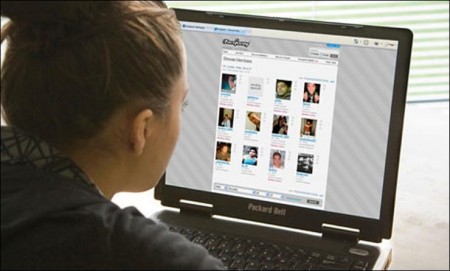Online dating isn’t the future of romance, it’s the present. According to new Pew findings, one-in-ten Americans and nearly 40% of singles on the romantic hunt have used an online dating site or app. It seems to be working: nearly a quarter of online daters have met a long-term partner or spouse through the sites.
While many folks still hold a low opinion of internet daters, the cultural tides are turning, and romances kindled online are increasingly mainstream. There are, of course, downsides to meeting people online, just as there are to meeting people in any other venue. But for better or worse, internet dating is revolutionizing how we find partners – and it’s making the dating process an increasingly gender-equal and progressive one.
Old rules of dating put men in charge. Men did the asking, the planning of the date, the paying, and the asking-out-again. Women waited, made ourselves presentable, and hoped flirtations with the object of our interest would lead to an ask-out. There have always been a small handful of women who would pursue men directly, but traditionally, dating has been led by the male of the species.
And women, not wanting to appear rude, have for decades accepted invitations for dates we simply were not interested in going on. It’s a well-documented social phenomenon that women are expected to be nice and accommodating, especially to men, including the ones who ask us out. It puts women in an awkward situation, it makes men feel resentful and it wastes everyone’s time.
Online dating upends that to various degrees. It’s just as acceptable in an online space for a woman to message a man she thinks is cute as it is for a man to reach out to a woman. Most sites also have a variety of functions to show your interest if you’re not quite ready to send a full message. You can “favorite” a person’s profile, for example, letting them see that you’re interested and encouraging them to go from there.
You can also reject someone politely and efficiently with no (or at least few) hard feelings. While there are folks who get bent of out shape when their message goes unanswered – newsflash: there are crazy people on the internet – most online daters recognize that every message is a shot in the dark, and no one is obligated to respond unless they’re similarly interested. For a lot of women, the ability to avoid unwanted dates without risking offense or breaking social norms is an incredible relief. And men benefit too, by going into a date with relative certainty that the person he’s going out with at least finds him attractive on “paper” and in pictures.
Online dating also cuts through some of the unnecessary confusion in “normal” dating. Critics argue that finding a mate online removes serendipity and organic connection. That’s true, sort of – you do need to interact with someone in person to really evaluate a connection or a physical attraction. But you don’t need to meet someone in the subway or at a bar to discern a connection.
Initial offline meetings come with their own set of perils: meet someone through a friend and you’re more likely to think they’re a good person who shares your general interests and perspectives, which simply might not be true at all. It’s easy to disrupt your social group if you go out with someone a few times and then one of you loses interest while the other feels a connection.
More troubling is connecting, dating and developing real feelings before realizing you aren’t fundamentally compatible based on factors that would have been deal-breakers if you read about your partner on paper – maybe common ones like religion, politics and life goals, or specific interests like needing someone who will tolerate your playing video games for eight hours a day.
By contrast, being clear in your own dating profile can filter out fundamentally incompatible mates. Are you, say, a liberal feminist Brooklynite who would never have sex with a Republican, considers dating someone in Queens a long-distance relationship and has actual nightmares about waking up in a suburban house with a Range Rover in the driveway? That can all be specified.
Up-front disclosure helps to find someone who fits your needs, whether you want to date someone who shares your religious values, or if you have a particular fetish that you may not want to mention on a first date but that you won’t be satisfied without. Perhaps most crucially, a dating website opens up a new universe of people to meet – far more than you’ll see out at the bar down the street.
Meeting dates online, just like meeting them off, comes with negatives. The most obvious is that people lie in ways large and small. My online dating profile says I’m 5’3″ when I’m actually five-two-and-a-half, indicates I’d date anyone in the New York region when, in fact, wild horses couldn’t drag me to Staten Island and fails to disclose that in terms of hours watched, Say Yes To The Dress might qualify as one of my favorite shows.
There is also the lack of agreed-upon rules and social conventions. After how many dates with someone do you both take down your profiles? How much information is too much? It took a week for that guy to message me back – is it because I’m a hideous beast, or is he just busy? With the seemingly endless supply of internet singles and without the accountability of overlapping social groups, it’s easy for a post-date week to consist of one party going on half a dozen new dates while the other sits home waiting for a call to be returned.
And for each person who seems great, there’s a sea of other possibilities just a click away. You may get along with the person in front of you, but maybe there’s someone else out there who shares your dedication to Crossfit or your penchant for Italian cinema, or who’s just a little bit taller, or has a more interesting job. It can be overwhelming, and too tempting to resist.
What’s most heartening about the Pew poll, though, is the recognition that the internet plays a crucial role in our “real” lives, and there isn’t such a clear dividing line between how we live digitally and how we live in the world. We do our activism online, signing petitions and emailing our politicians.
We do our learning online, having access to many more opinion and news pieces than we did in the pre-digital age, and even taking college courses. We’re even able to interact directly with writers, thought leaders and fellow interested citizens on platforms like Twitter and Tumblr just as we can remain connected to our family and friends near and far, seeing their pictures and updates on Facebook. We can keep in regular contact with our closest confidants, g-chatting throughout the work day or texting to make plans.
It makes sense that dating is part of that new world too. We can start romances through dating sites, get laid with apps like Grindr or Tinder, and flirt with our romantic interests or our long-time loves by sending racy Snapchats, or sexy texts. Or we can at least attempt to make our exes jealous by posting enviable Instagrams.
Is there something lost in this new world of dating? Of course. Is it often terrifying to tread new territory without the clear romantic rules our grandmothers knew? Yes. Is this universe with its dizzying array of options and increasingly equal playing field far better than the old model, even with the attendant fear of choosing the wrong thing? You bet.
Visits: 72




